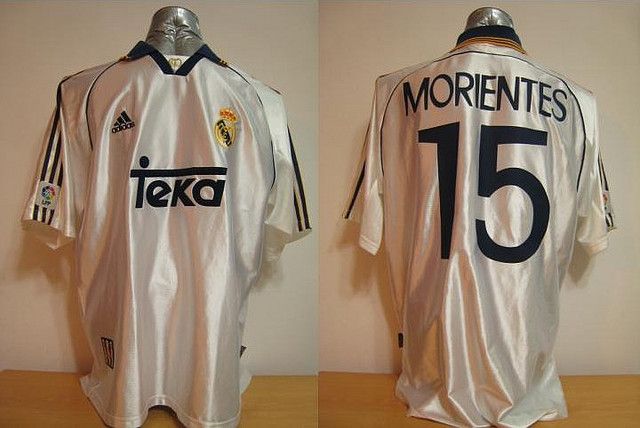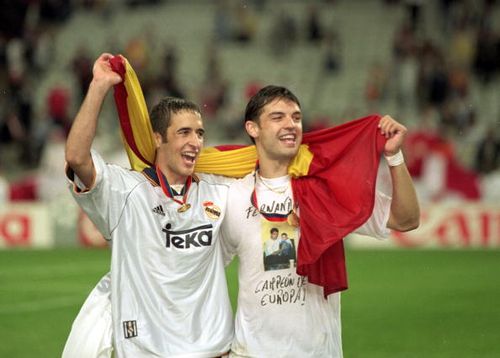
El Moro: A modern Spanish great
With 208 goals in 566 appearances in all competitions for club, and 27 goals in 47 appearances for the Spanish national team, Fernando Morientes is no less than a modern great. But as people often talk about Real Madrid’s Galacticos era, they often fail to mention the name of the young lad from Sonseca, who made it big on football’s biggest stage, the Estadio Santiago Bernabeu.
20 years ago, a boy made his debut for a club struggling against relegation in Spain’s top flight, Albacete Balompie. Netting 7 goals in 26 games for Albacete, the lad was set to make it big, eventually securing a move to a top 10 club, Real Zaragoza. Albacete were relegated from the Spanish first division, the season after Morientes made his switch.
At Zaragoza, the 19 year old Morientes netted 18 goals in all competitions in his first season, with 13 coming in the La Liga itself. The second season at the Aragon club saw Morientes net 16 goals again, with the big clubs now beginning to notice the talent.
After 2 seasons at Zaragoza, Morientes was signed by Spain’s biggest club, Real Madrid CF. The 1996-97 season’s Liga win had been a close shave, with Barcelona trailing the champions by just two points. A player who had averaged a little less than a goal for every game played, seemed to be the best option for Madrid to blood their front line, and that’s just what new Madrid manager Jupp Heynckes urged the board to do.

Madrid finished fourth in the league that season, but on a personal level, Morientes seemed to have settled into Spain’s top most club. Seen as a back up behind the triad of Suker, Mijatovic and Raul, Morientes managed 12 goals in the La Liga, and 16 overall. It was a rather mixed season for Madrid, as the poor domestic show was compensated for by their first European Cup since 1966. Morientes would finish the season as Madrid’s top scorer in the continental competition, with 4 goals overall.
The ’98 – ’99 season was when Morientes truly broke into Real’s front line, owing to injuries to Mijatovic, and the dipping form of Davor Suker. Under new boss Jose Antonio Camacho, the new partnership of Raul and Morientes as we remember it truly began to thrive, with the duo netting 44 goals between them; a deadly tally in the La Liga then. With 3 bosses in the season, Madrid finished with a rather gaping deficit of 10 points behind Barca.
The 1999-2000 season continued to be a similar one for Morientes, as Real Madrid had a rather poor domestic show, but were eventual winners of the European Cup, beating Valencia by 3 goals in the final, with Morientes scoring the opening goal of the game. The season also saw Morientes make his breakthrough into the national side, with a brace on his debut against the Swiss, and 7 international goals overall.

Raul (left) and Fernando Morientes (right) of Real Madrid celebrate after the European Champions League Final 2000 at the Stade de France, Saint-Denis, France. Real Madrid won 3-0.
The 2000-01 season finally saw Morientes pick up a winners’ medal, though he only managed 6 goals in 22 appearances, due to injury. Madrid relied heavily on Raul, who eventually bagged the Pichichi with 24 goals, to win the domestic title. The following season saw Morientes fire 21 goals in all competitions, with 18 in the La Liga, even though Madrid could only finish third in the league, in a season that was Valencia’s.
Brazilian samba king Ronaldo’s arrival put Morientes’s first team status in debate, though the Spaniard netted 5 goals, all in lost causes as Real eventually took the La Liga title again.
Vicente Del Bosque’s new Madrid side was up for an overhaul, and Morientes was loaned out to AS Monaco. In a stellar and rather surprising season, Morientes scored 22 goals overall. The season saw Monaco reach their first and only Champions League final. En route to Gelsenkirchen, Morientes was instrumental in rooting out Real in the semi’s, with the player scoring in both the legs of the fixture.
The following season saw Morientes return to a Madrid side being lavishly built around the wealth of Florentino Perez; most notably, the Liverpool sensation, Michael Owen. Proving surplus to club requirements, Morientes made a January move to English top club, Liverpool. Had he not been cup tied, he would have earned a Champions League medal with Liverpool later in the season. Struggling to adapt to English football, Morientes ended his Merseyside stay with 12 goals in 60 appearances, and a FA Cup winner’s medal.
The following season saw him being shipped off to Valencia, where he partnered the young phenomenon, David Villa. His impressive form saw him net 19 goals, and he helped Valencia finish fourth in the league. His form also earned him a place in the Spanish side, with the player scoring his last goal for Spain, the 27th, in a Euro 2008 qualifier against Denmark.
Past his 30th birthday, into his second year at the Los Che, he saw a dip in his form and was often benched. The much travelled striker made one final move to French giants, Olympique Marseille. Though he was very much a fringe player at the club, we saw Morientes add Ligue 1 and Coupe de la Ligue medals to his cabinet.
Morientes will always be remembered for his aerial prowess, and ability to link up intelligently with other forwards. Though he did not possess the goal scoring prowess of his contemporaries, Morientes was a delight to watch when partnering Raul at Madrid. The player also managed phenomenal goal averages at the most competitive levels of European club and international football. Morientes has only fond memories of a club he had grown to love, and whose fans reciprocated the emotion. The striker is fifth in Spain’s all time list of top scorers for the national team.
In 2012, Fernando Morientes was appointed as the coach of the Juvenil B team, in Madrid’s youth system.
Morientes was, and remains to be one of Spain’s greatest modern greats, though his exploit’s may be eclipsed by the recent emergence of Barca’s golden generation, who have taken Spain to the apex of world football.